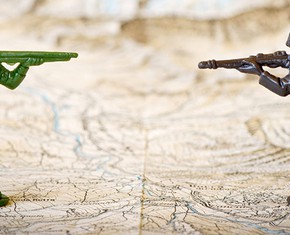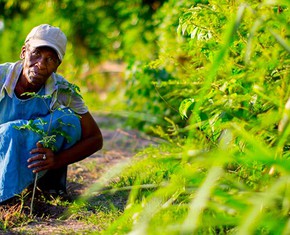The views expressed in our content reflect individual perspectives and do not represent the authoritative views of the Baha'i Faith.
Barbarism is the natural state of mankind. Civilization is unnatural. It is a whim of circumstance. And barbarism must always ultimately triumph. – Robert E. Howard
Instead of civilization being artificial it is a part of nature; all of a piece with the development of an embryo or the unfolding of a flower. The modifications mankind have undergone, and are still undergoing, result from a law underlying the whole organic creation; and provided the human race continues, and the constitution of things remains the same, those modifications must end in completeness. – Herbert Spencer
Man is civilized by virtue of social relations; and refinement is the becoming divested from grossness, vulgarity, and the evil manners which are characteristic and incident to a living for one’s self alone. Selfishness is savagery; and a state of society in which self-interest is the ruling element is hardly yet reclaimed from the state of barbarism. It is of little avail to appeal to skill in mechanics, engineering, and other attainments in the plane of material evolution. These are not adequate proof of spiritual advancement. Kindly sentiment toward others, sincere regard for their welfare, charity in will and act, make the only real culture and civilization. – Alexander Wilder
Which one of these quotes strike you as most true? From a Baha’i perspective, human civilization can be either a great bounty or a great detriment, depending on its state of spiritual advancement:
How grievous it is to see how man has used his God-given gift to frame instruments of war, for breaking the Commandment of God “Thou shalt not kill”, and for defying Christ’s injunction to “Love one another.”
God gave this power to man that it might be used for the advancement of civilization, for the good of humanity, to increase love and concord and peace. But man prefers to use this gift to destroy instead of to build, for injustice and oppression, for hatred and discord and devastation, for the destruction of his fellow-creatures, whom Christ has commanded that he should love as himself!
I hope that you will use your understanding to promote the unity and tranquillity of mankind, to give enlightenment and civilization to the people, to produce love all around you, and to bring about the universal peace. – Abdu’l-Baha, Paris Talks, pp. 42-43.
In the eighth and last United Nations’ Millennium Development Goal—Develop a Global Partnership for Development—we see reflected exactly what the Baha’i teachings have recommended for a century and a half. The global partnership the UN refers to, and the unity and tranquility of mankind that Abdu’l-Baha referred to, both encompass the idea of bringing increased civilization and peace to the world.
In this final MDG goal, that global partnership calls for developing an open, rule-based, predictable, non-discriminatory trading and financial system. The Baha’i teachings take that a step further, calling for a unified global economy. In the MDG goal, the UN asks the world to address the special needs of the least developed nations, landlocked developing countries and small island developing States. The Baha’i teachings concur, asking us to work together to lift all peoples and nations out of poverty, and to develop a fair and equitable economic system by applying spiritual solutions to the world’s deep inequities.
Accordingly, the final MDG goal calls on the world to deal comprehensively with the crushing debt burdens of developing countries, which has actually begun to happen, thanks to the efforts of not only developed nations and their governments but of spirited and effective public campaigns to reduce developing world debt, led by artists and NGOs around the world:
In 2013, the debt burden of developing countries was 3.1 per cent, a major improvement over the 2000 figure of 12.0 per cent. – UN MDG 2015 Report.
A new sense of international unity has begun building among the Earth’s nations. Without question, the world has now become completely interdependent. The era of the “independent, sovereign nation” has passed into history. No nation today is self-sufficient, self-contained or self-sustaining. Economically, we are already one planet. Now, the Baha’i teachings say, we can take the next step and fully recognize our oneness, putting it into practice for the benefit of all humanity:
Praise be to God, throughout succeeding centuries and ages the call of civilization hath been raised, the world of humanity hath been advancing and progressing day by day, various countries have been developing by leaps and bounds, and material improvements have increased, until the world of existence obtained universal capacity to receive the spiritual teachings and to hearken to the Divine Call. The suckling babe passeth through various physical stages, growing and developing at every stage, until its body reacheth the age of maturity. Having arrived at this stage it acquireth the capacity to manifest spiritual and intellectual perfections. The lights of comprehension, intelligence and knowledge become perceptible in it and the powers of its soul unfold.
Similarly, in the contingent world, the human species hath undergone progressive physical changes and, by a slow process, hath scaled the ladder of civilization, realizing in itself the wonders, excellencies and gifts of humanity in their most glorious form, until it gained the capacity to express the splendours of spiritual perfections and divine ideals and became capable of hearkening to the call of God. Then at last the call of the Kingdom was raised, the spiritual virtues and perfections were revealed, the Sun of Reality dawned, and the teachings of the Most Great Peace, of the oneness of the world of humanity and of the universality of men, were promoted. We hope that the effulgence of these rays shall become more and more intense, and the ideal virtues more resplendent, so that the goal of this universal human process will be attained and the love of God will appear in the utmost grace and beauty and bedazzle all hearts. – Abdu’l-Baha, Selections from the Writings of Abdu’l-Baha, pp. 285-286.
Next: A Golden Age: Ridding the Earth of Conflict
















Comments
Sign in or create an account
Continue with Googleor